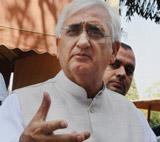 Welcoming Italy's decision to send back two marines, the minister said the decision has to be conveyed to the Supreme Court through proper procedure and he would apprise Parliament about it.
Welcoming Italy's decision to send back two marines, the minister said the decision has to be conveyed to the Supreme Court through proper procedure and he would apprise Parliament about it.
"I would like as I have said to share whatever developments have happened with Parliament but I can certainly say we have been in constant contact.
I have repeatedly said that you should not write off diplomacy to soon... So at last I can say that diplomacy continues to work when everybody else thinks that everything is lost and please give diplomacy a little more chance to do things that are important for our country," he said.
Khurshid also said that "Law remains as it is. Nothing changes as far as the law is concerned and my understanding can't change the law".
Italy last night said it will send back to India two marines to face trial for killing two fishermen after receiving an assurance from the Indian government about the protection of their fundamental rights.
Asked about reports in the Italian media that Gandhi influenced the decision on the marines, he said, "The diplomacy that we do under this government, diplomacy that we do for that matter for any policy implemented by this government is obviously given a direction, given an impetus by the Prime Minister and the Congress President.
"It is a government that is led by them and then for anyone else amongst us to take credit I think would be unbecoming. They lead it from the front. We don't share.
We cannot share with you everything that is said to us privately within the confines of government but the bottomline of what we are expected to I think becomes clear in the public sphere," he said.
On what would be the BJP's reaction to the decision of the marines to return, Khurshid said, "I don't know whether it is an issue or not an issue but I hope they take it in the right context.
I hope that if something has been in the national interest and that bolsters the national interest, it should be welcomed by everybody".
On apprising the Supreme Court about the matter, he said, "No I don't think that the information to the apex court can be given in this manner and the matter is listed on April 2.
"So, they (parties concerned) will have to decide and if they want any modification of the order that was made, there are procedures. The lawyers will be able to follow so that will come in due course. Today is Friday and as you know that the court will not be sitting on Saturday and Sunday.
"So on Monday, if felt appropriate by any party, they can bring it to the notice of the court and it has to be done properly.
"As far as we are concerned, we will take Parliament on board. We will share it with Parliament because this has been a huge issue while Parliament was in session," he said.
Italy's previous decision not to send marines - Massimiliano Lattore and Salvatore Girone - to face trial triggered a diplomatic standoff, with the Indian Supreme Court barring the Italian ambassador from leaving the country.
Prime Minister Manmohan Singh last week termed as "unacceptable" Italy's refusal to send its two marines back to India and said the issue will be taken up with that country.
"In light of the assurances received, the Government has considered the opportunity, in the interests of Fusiliers Marina, to maintain the commitment made at the permission to participate in the vote back in India by March 22," the Italian government had said in a statement.
"The marines agreed to this decision," it added.

Rome, Mar 22: The Italian government has said it will return to India two marines facing murder charges in the shooting deaths of two fishermen off the Kerala coast.
The announcement on Thursday reversed an earlier decision by the Foreign Ministry that the duo would not return on Friday (March 22), as agreed, after they were granted permission to return home to vote in the Italian elections.
The case escalated tensions between India and Italy. The Indian Supreme Court announced that the Italian Ambassador could not leave the country.
Special Correspondent reports:
According to Italian news agency ANSA, which quoted Italy’s deputy foreign minister Steffan de Mistura, the breakthrough came after the Indian government assured the Italian authorities there would be no death penalty against the two marines.
The Italian government also obtained a written assurance from the government that the fundamental rights of the two marines would be protected.





Comments
Add new comment